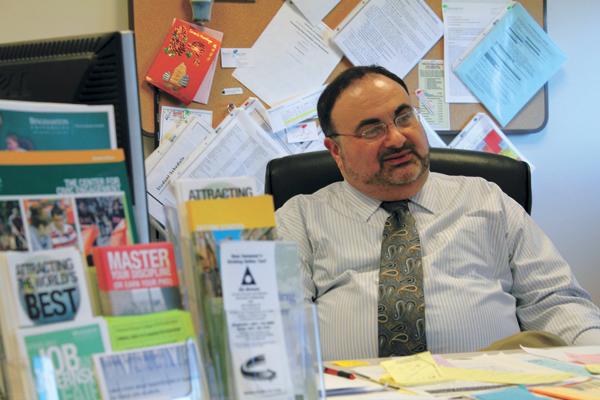
The current turbulence of the job market has led many college students to question whether to choose their majors based on which fields jobs are most available in or based on their academic interests.
According to the U.S. Bureau of Labor Statistics, jobs directly related to science and engineering are among those projected to increase at the highest rate in the near future.
A BLS study projects that the number of jobs available for registered nurses and home health aides will increase more than any other occupations between 2008 and 2018.
The study also said that though the fields currently have smaller job bases, biomedical engineering and network and data communications system analysis will increase at the fastest rate during the same period.
THE JOB MARKET AND CAREER CHOICE
These predictions have left some students in the liberal arts and humanities feeling anxious regarding their job prospects.
Ana Collado, a sophomore double-majoring in psychology and Spanish, said that the present job market made her feel nervous about her career after graduation.
“I feel nervous, because I don’t know if the jobs are going to be there for me,” she said.
Callado did note, however, that while she believes that her majors will lead to a successful career, she chose them out of “true academic interest.” But she said she felt it was OK for students to pick an academic track based on expectations that it will lead to a “secure job.”
“Going where the jobs are certainly sounds like a wise choice; however, our alumni often tell students to follow whatever their passion is,” stated Steve Seepersaud, a communications specialist in the Alumni Relations Office, in an e-mail. “If a person isn’t strongly interested in a field, but studies that particular field thinking jobs are more abundant, he or she may become dissatisfied with the career choice at some point.”
Christina Abate, a junior majoring in mechanical engineering, said that she knows people who choose their majors based on the demands of the job market. But she too insists she choose her major because she has a passion for the subject.
“It’s more important for me to be happy,” Abate said.
Advisers in the Harpur College Academic Advising Office say that they have been receiving questions regarding majors and career choices in greater number recently.
“Given the economic situation … some students are asking these questions with a greater degree of passion,” said Larry Greenfield, the director of Harpur Academic Advising. “When students think about a degree in liberal arts, there are misconceptions,” he said. “A major and a degree is not the same thing,” he said.
Greenfield, who majored in history at Ohio State University, said that liberal arts degrees give students skills, like thinking critically, logically and symbolically, that can be applied to many jobs and are sought after by employers. He also noted that it might not be advantageous to consider job growth predictions because those predictions could be irrelevant or outdated by the time students graduate from college.
SHIFT IN EDUCATION AND NATIONAL POLITICS TOWARD SCIENCES
President Barack Obama has called for U.S. schools to produce more scientists and technology experts to keep the country competitive in the global economy. In a speech given at Penn State University on Feb. 3, Obama told students, “if we want … jobs and businesses to thrive in the United States of America, we’re going to have to out-innovate and out-educate and out-build the rest of the world.”
Obama noted that China and India have “started educating their children earlier and longer, with greater emphasis on math and science.”
Holly Horn, assistant director of the Career Development Center, said that she sees students wanting a more defined career path, like the ones offered by pre-professional schools like the Decker School of Nursing and the School of Management. Horn also said she believes that some parents push their children into such defined career paths.
“Everybody needs to understand that your major does not equal your career choices,” Horn said. “If I am a philosophy major, I might not be a philosopher.”
Horn encourages students to be creative in approaching the career process at CDC programs that offer students guidance on degree and career choices, like “Liberal Arts to Careers Externship Info,” an event scheduled for Wednesday, Feb. 16 at 4:40 p.m. in Old University Union room 103.
Others in the near future include “OMG! I Have to Choose a Major,” which will take place place Feb. 17, at 3 p.m. in New University Union room 325, and “Liberal Arts to Public Service,” which will take place Feb. 15 at 3:30 p.m. in a location to be determined.


